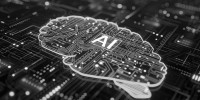
AI and ML: Transforming Healthcare and Medicine
Discover how artificial intelligence (AI) and machine learning (ML) are revolutionizing healthcare. From disease diagnosis to personalized treatment plans, these technologies are transforming patient care and paving the way for a healthier future. Dive into the details and explore the remarkable advancements shaping the medical field today!
Revolutionizing Healthcare: The Impact of AI and Machine Learning
Artificial intelligence (AI) and machine learning (ML) are not just the buzzwords of today but the transformative forces driving the future of healthcare. As highlighted in Karine Sargsyan's study, AI and ML are at the forefront of revolutionizing patient care, diagnostics, and biomedical research. These technologies promise to modernize every aspect of healthcare, from early disease detection to personalized treatment plans.
In this article, we delve into the results presented in a new publication by Karine Sargsyan, an Armenian-Austrian physician, geneticist, research manager and biobank operator, showcasing how AI and ML are making significant strides in the healthcare sector.
At a Glance:
Disease Diagnosis and Prognosis: Enhanced accuracy in disease detection.
Medical Imaging Interpretation: Improved precision in analyzing medical images.
Laboratory Medicine: Better predictive outcomes and patient management.
Drug Discovery and Development: Accelerated and cost-effective drug discovery.
Personalized Medicine: Tailored treatment plans based on individual factors.
Virtual Health Assistants: Real-time health monitoring and personalized advice.
Predictive Analytics for Preventive Care: Early disease risk prediction.
Robotics in Surgery: Increased precision and reduced recovery times.
Continuous Monitoring for Chronic Disease Management: Early identification of complications.
 In 2024, AI and ML seem to have penetrated almost every aspect of our professional lives, and this is happening at pace. Such transformative technology ensures to modernize (if not upgrade) the provision of healthcare at every level (prevention, diagnosis, treatment, and long-term care, as well as public health and management), if the healthcare industry can keep up with the speed.
In 2024, AI and ML seem to have penetrated almost every aspect of our professional lives, and this is happening at pace. Such transformative technology ensures to modernize (if not upgrade) the provision of healthcare at every level (prevention, diagnosis, treatment, and long-term care, as well as public health and management), if the healthcare industry can keep up with the speed.
AI in Disease Diagnosis and Prognosis
AI and ML have shown remarkable potential in improving disease diagnosis and prognosis. Sargsyan's study highlights how AI-powered tools can assist healthcare professionals in making more accurate diagnoses, particularly in fields relying heavily on visual inspection.
Advancements in Medical Imaging Interpretation
Medical imaging is another area where AI and ML have made significant strides. According to Sargsyan, AI algorithms can analyze digital pathology images with high accuracy, identifying patterns that might be missed by human eyes. This has profound implications for diagnosing systemic diseases and cancer.
Transforming Laboratory Medicine
AI and ML are also reshaping laboratory medicine by improving predictive outcomes and patient management. Sargsyan's research demonstrates that ML algorithms applied to electronic health records can predict drug side effects, enabling healthcare providers to create more personalized and safer medication regimens.
Accelerating Drug Discovery and Development
AI and ML are revolutionizing drug discovery and development by predicting molecular properties and identifying potential drug candidates. Sargsyan discusses how AI-based systems facilitate drug discovery, ultimately reducing the time and cost associated with traditional methods.
The Promise of Personalized Medicine
One of the most exciting applications of AI and ML in healthcare is personalized medicine. Sargsyan's study demonstrates how ML algorithms can predict patient outcomes and recommend tailored treatment strategies. This approach ensures that each patient receives the most effective and personalized care possible.
Revolutionary Applications of AI and ML in Medicine
Beyond these conventional applications, AI and ML are also paving the way for revolutionary advancements in healthcare:
Virtual Health Assistants
AI-powered virtual health assistants offer personalized health advice, medication reminders, and real-time symptom monitoring. These assistants empower patients to take charge of their health and adhere to treatment plans more effectively.
Predictive Analytics for Preventive Care
AI and ML can analyze vast amounts of data to predict disease risks and recommend preventive measures. This proactive approach can significantly reduce healthcare costs and improve public health outcomes.
Robotics in Surgery
Robotic surgery, enhanced by AI and ML, allows for minimally invasive procedures with greater precision. This leads to better surgical outcomes, shorter recovery times, and reduced complications.
Continuous Monitoring for Chronic Disease Management
AI-powered monitoring systems can continuously track physiological parameters and biomarkers in patients with chronic diseases. This early detection capability allows for timely interventions, improving patient outcomes and reducing hospital readmissions.
Challenges and Considerations
Despite the numerous benefits, integrating AI and ML into clinical practice comes with challenges. Issues like data privacy, algorithmic transparency, legal compliance, and ethical considerations must be addressed. Collaboration among researchers, healthcare providers, and policymakers is essential to develop robust frameworks that ensure patient safety and privacy.
Conclusion
AI and ML are undeniably transforming healthcare. From disease diagnosis and medical imaging to drug discovery and personalized medicine, these technologies promise to enhance patient outcomes and healthcare delivery. However, to fully realize their potential, we must address challenges related to data privacy, algorithmic transparency, and ethical concerns. By working together, stakeholders can harness the power of AI and ML to usher in a new era of precision medicine.
As Sargsyan notes:
 AI and ML promise unparalleled opportunities to advance the medical field with decision-support, novel personalized (or precision) medicine methods, more functional end effective treatment plans, and increased productivity of the total healthcare system.
AI and ML promise unparalleled opportunities to advance the medical field with decision-support, novel personalized (or precision) medicine methods, more functional end effective treatment plans, and increased productivity of the total healthcare system.